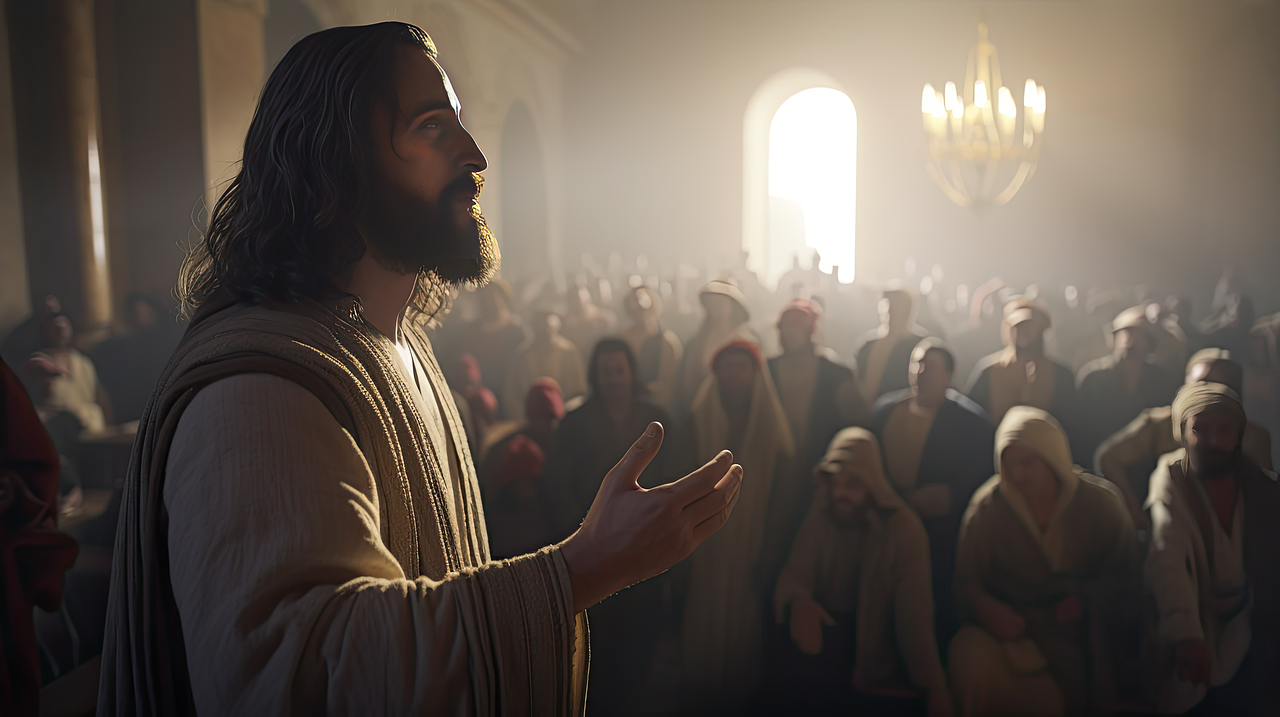This article delves into the themes of faithlessness, prophetic rebuke, and the call to return to God in Jeremiah 5, examining its context, analyzing its portrayal of faithlessness, exploring its connection to Jesus teachings, reflecting on its relevance to modern faith, and considering the consequences of forsaking God.

Photo by petr sidorov on Unsplash | Commercial use allowed
Overview of Jeremiah 5
Jeremiah 5 is a profound chapter within the biblical narrative, offering valuable insights into the themes of faithlessness, prophetic rebuke, and the call to return to God. The context of Jeremiah 5, particularly the prophet’s relentless search for a righteous individual in Jerusalem, serves as a poignant reflection of the prevailing moral and spiritual challenges faced by the people of that era. This search not only underscores the rarity of genuine faithfulness and integrity but also emphasizes the significance of these virtues in the eyes of God. The prophet’s quest is symbolic of the moral fabric of the entire community, highlighting the dire state of affairs where the lack of righteousness and truthfulness was prominent. This sets the stage for a profound exploration of faithlessness and its consequences, offering timeless lessons for individuals and communities alike.
One example that illustrates the significance of Jeremiah 5 is the portrayal of the prophet’s search for a righteous man in Jerusalem. Despite his relentless efforts, Jeremiah found none, highlighting the widespread moral decay and lack of adherence to God’s principles. This exemplifies the urgency of the divine call for repentance and renewal, emphasizing the rarity of righteousness and truthfulness within the community. The absence of a righteous person in the city serves as a stark reminder of the prevailing moral and spiritual challenges, setting the tone for the subsequent exploration of faithlessness and its consequences.
The implications of Jeremiah 5’s portrayal of Jerusalem’s spiritual condition are profound. It serves as a compelling cautionary tale about the consequences of forsaking God and neglecting His commandments. The pervasive faithlessness and moral decay ultimately lead to divine judgment, offering a timeless reflection on the enduring relevance of faithfulness and the dire consequences of moral and spiritual apathy. This narrative invites readers to reflect on the state of their own faith communities and the imperative of upholding righteousness and faithfulness in the midst of societal challenges and moral decay.
 Understanding Jeremiah 5
Understanding Jeremiah 5
Jeremiah 5 is situated in a crucial period of Israel’s history, characterized by spiritual and moral decline, as well as impending judgment. The prophet’s relentless search for a righteous man in Jerusalem underscores the pervasive corruption and rebellion that had gripped the city. This search is not just a quest for an individual, but a symbolic representation of the moral fabric of the entire community. The absence of a righteous person in the city highlights the extent of the spiritual decay, emphasizing the urgency of the divine call for repentance and renewal.
Furthermore, the implications of Jeremiah 5’s portrayal of Jerusalem’s spiritual condition are profound. It serves as a stark warning about the consequences of forsaking God and neglecting His commandments. Despite the prophet’s efforts, the pervasive faithlessness and moral decay ultimately lead to divine judgment. This narrative invites readers to reflect on the state of their own faith communities and the imperative of upholding righteousness and faithfulness in the midst of societal challenges and moral decay. The narrative of Jeremiah 5 thus stands as a timeless reminder of the enduring relevance of faithfulness and the dire consequences of moral and spiritual apathy.
Additionally, the chapter also sheds light on the prophet’s unwavering commitment to seeking righteousness and truthfulness in the city. Jeremiah’s persistent search for a righteous person underscores the value of these virtues in the eyes of God, emphasizing the significance of moral rectitude amidst prevailing moral decay. His quest signifies the urgency of spiritual renewal and the need for individuals to embody righteousness and truthfulness in their lives. This emphasizes the enduring relevance of Jeremiah 5’s message in guiding individuals towards a life characterized by righteousness and faithfulness.
Analysis of Faithlessness and Prophetic Rebuke
Jeremiah 5 vividly depicts the faithlessness of the people and the consequent rebuke from the prophet, highlighting the erosion of moral values and the abandonment of God’s commandments. The chapter also elucidates the severe consequences and judgments that await the rebellious and unrepentant.
Furthermore, the prophet’s search for a righteous person in Jerusalem serves as a poignant illustration of the widespread moral decay and lack of adherence to God’s principles. This aspect of the narrative emphasizes the gravity of the people’s faithlessness and the urgency of the prophetic rebuke, underscoring the dire need for repentance and a return to righteousness. The prophet’s unwavering commitment to seeking righteousness and truthfulness in the city signifies the urgency of spiritual renewal and the need for individuals to embody righteousness and truthfulness in their lives.
In addition, Jeremiah 5 reveals the tragic reality of a city filled with corruption and a rebellious heart. The text vividly portrays the moral decay and unfaithfulness prevalent among the people, emphasizing the severity of the spiritual decline that had taken root within the community. The prophet’s rebuke serves as a solemn reminder of the consequences of forsaking God and the urgency of embracing repentance and obedience. This profound reflection serves as a pivotal lesson for contemporary believers, prompting them to consider the eternal implications of their choices and the enduring relevance of Jeremiah 5’s message in guiding their spiritual journey.
 Connection to Jesus’ Teachings
Connection to Jesus’ Teachings
Jeremiah 5 provides a profound connection to Jesus’ teachings on repentance and the call to return to God, highlighting the enduring significance of the themes presented in this prophetic book. One notable connection between Jeremiah 5 and Jesus’ message is the emphasis on the necessity of repentance. In Jeremiah 5, the people of Jerusalem are called to turn away from their faithlessness and return to God, echoing Jesus’ call for repentance as a fundamental aspect of spiritual renewal and reconciliation with God.
Moreover, the portrayal of God’s longing for His people to return to Him in Jeremiah 5 aligns with Jesus’ teachings on God’s unwavering love and desire for reconciliation. This parallels with the parable of the Prodigal Son in the New Testament, where Jesus illustrates God’s eagerness to welcome back those who have strayed, emphasizing the theme of returning to God as a central message in both Jeremiah 5 and Jesus’ teachings. The connections between Jeremiah 5 and Jesus’ teachings serve as a timeless reminder of the universal call to repentance and the enduring relevance of the prophetic message for individuals seeking spiritual restoration and reconciliation.
Jeremiah 5 also provides a compelling link to Jesus’ teachings on the consequences of forsaking God and the imperative of embracing righteousness and truthfulness. This parallel underscores the seamless continuity of the biblical narrative, highlighting the harmonious thread of God’s redemptive plan woven throughout the Old and New Testaments, culminating in Jesus’ profound call for repentance and return to God. The enduring relevance of the themes presented in Jeremiah 5 resonates with the spiritual quest of individuals in the present age, offering timeless guidance for those seeking reconciliation and renewal in their relationship with God.
Reflecting on Modern Faith and Spirituality
The themes elucidated in Jeremiah 5 hold significant relevance for contemporary faith and spirituality, offering poignant lessons and cautionary tales for individuals navigating their spiritual journeys. The warnings and admonitions from Jeremiah 5 serve as timeless guideposts for modern believers, urging them to heed the perils of straying from the path of righteousness and faithfulness.
Furthermore, the faithlessness and prophetic rebuke depicted in Jeremiah 5 illuminate the consequences of forsaking God, which can be a sobering reflection for individuals in the present day. It prompts modern readers to consider the implications of their own actions and choices, emphasizing the importance of remaining steadfast in faith and avoiding the pitfalls of spiritual complacency. This introspective analysis can lead to a deeper understanding of the value of genuine repentance, the significance of seeking truth, and the necessity of aligning one’s life with the principles of righteousness expounded in the Scriptures.
In applying the teachings of Jeremiah 5 to contemporary life, believers are challenged to examine their own faithfulness and relationship with God. This introspective analysis can lead to a deeper understanding of the value of genuine repentance, the significance of seeking truth, and the necessity of aligning one’s life with the principles of righteousness expounded in the Scriptures. By embracing these principles, individuals can strive to embody the faithful and just characteristics that are advocated in Jeremiah 5, reinforcing the enduring relevance of this ancient text in the context of modern spirituality.
Moreover, Jeremiah 5 serves as a poignant reminder of the enduring relevance of faithfulness and the dire consequences of moral and spiritual apathy. The chapter’s timeless message challenges individuals to examine their own hearts and actions, compelling them to seek righteousness, truth, and a genuine relationship with God [1]. As such, Jeremiah 5 stands as a poignant reminder of the enduring need for repentance, restoration, and unwavering devotion to God, resonating with the spiritual quest of individuals in the present age.
#Jeremiah5 #InvestigatingFaithlessness #PropheticRebuke #JesusCalltoReturn #Accountability #PropheticWarning #Faithfulness #Repentance #Restoration #DivineRebuke #ReturntoGod #Redemption #Consequences #TurningAway #SpiritualExamination #PropheticInsight
The Obedience of Nature and the Rebellion of God’s People
Jeremiah 5:22-23 provides a striking analogy that highlights the stark contrast between the obedience displayed in nature and the rebellion of God’s people. The passage draws attention to the obedience of the sea and the sand, which are bound by the natural laws set by God, in contrast to the defiance and disobedience exhibited by the people of Israel. This comparison underscores the inherent order and submission to God’s authority found in nature, while emphasizing the rejection of God’s guidance and instruction by His chosen people.
One example that illuminates the significance of the obedience of nature and the rebellion of God’s people is the illustration of the sea and the sand in Jeremiah 5:22-23. This vivid imagery serves as a poignant reflection on the consequences of rebellion and the importance of embracing humility and obedience in relation to God’s divine will. The passage serves as a timeless reminder of the implications of resisting God’s will, prompting individuals to reflect on their own obedience to God and the consequences of rebellion. It serves as a call for individuals to consider the enduring relevance of this analogy in guiding their spiritual journey and fostering a deeper understanding of the consequences of faithfulness and faithlessness.
 The Plea for Finding a Just and Truthful Person
The Plea for Finding a Just and Truthful Person
Jeremiah 5:1 issues a poignant call to find a just and truthful individual within the streets of Jerusalem, signifying the pressing need for righteousness and truthfulness amidst pervasive moral decay. This plea resonates with timeless significance, underscoring the enduring value of integrity and fidelity to God’s commandments.
Furthermore, the plea in Jeremiah 5:1 serves as a solemn reminder of the scarcity of righteousness and truthfulness in a society engulfed in moral decline. It highlights the dire circumstances that prevailed in Jerusalem during Jeremiah’s time, as the prophet’s search for a single righteous person proved futile. The inability to find such an individual accentuates the severity of the people’s departure from God’s ways, emphasizing the widespread moral deterioration and unfaithfulness that had taken root within the community.
The call for a just and truthful person also reveals the profound impact of moral righteousness and truthfulness on a society. It underscores the pivotal role of integrity in upholding the moral fabric of a community and the importance of individuals who embody these virtues in guiding others back to the path of righteousness and faithfulness. This plea, therefore, prompts introspection and contemplation, compelling individuals to evaluate their own commitment to righteousness and truthfulness in the face of prevailing moral decay and societal challenges.
Insights from Commentaries and Analysis
When delving into the various interpretations and commentaries on Jeremiah 5:1, it becomes evident that the verse holds significant weight in emphasizing righteousness and the pursuit of truth. This plea for finding a just and truthful person serves as a poignant reminder of the moral compass that should guide individuals in their actions and decisions. It underscores the importance of integrity and honesty, urging people to uphold these virtues in their daily lives. The call for ethical rectitude within this verse resonates throughout the biblical narrative, reinforcing the timeless importance of moral uprightness.
Furthermore, the commentary on Jeremiah 5:1 sheds light on the implications of this plea. It not only serves as a call to action for the people of Jerusalem to turn away from their unjust and untruthful ways but also stands as a warning of the consequences of moral decay. The verse prompts introspection and contemplation, urging individuals to consider the impact of their choices on their spiritual and moral standing. As such, it underscores the enduring relevance of Jeremiah 5:1 in guiding individuals towards a life characterized by righteousness and truthfulness.
The Consequences of Forsaking God
Jeremiah 5 vividly illustrates the dire consequences faced by those who forsake God, providing a compelling depiction of the impending judgments and admonitions pronounced upon the unfaithful and rebellious. The chapter serves as a sobering reminder of the repercussions of turning away from God’s precepts and succumbing to moral decadence. This serves as a powerful warning to individuals and communities about the dangers of straying from God’s path and the serious ramifications that follow such actions.
One specific instance in Jeremiah 5 that highlights the consequences of forsaking God is the portrayal of a city mired in corruption and rebellion. The text describes how Jeremiah searched for a righteous person in Jerusalem but found none, emphasizing the prevalent moral decay and lack of adherence to God’s principles. This absence of righteousness and faithfulness signifies the severe spiritual decline and the subsequent judgment that the city would face due to their faithlessness. Furthermore, the chapter emphasizes the impending calamity and devastation that would befall the rebellious city, reinforcing the gravity of the consequences of forsaking God.
The warnings and judgments pronounced in Jeremiah 5 serve as a poignant reminder of the contrast between the blessings of obedience and the perils of disobedience. By examining the specific consequences outlined in the chapter, individuals are urged to reflect on the significance of remaining steadfast in their faith and the potential devastation that awaits those who abandon God’s ways. This profound reflection serves as a pivotal lesson for contemporary believers, prompting them to consider the eternal implications of their choices and the enduring relevance of Jeremiah 5’s message in guiding their spiritual journey.
 Final Thoughts on Jeremiah 5
Final Thoughts on Jeremiah 5
In reflection, Jeremiah 5 serves as a powerful testament to the consequences of forsaking God and the urgent call to repentance. Throughout the chapter, the prophet Jeremiah vividly portrays the faithlessness of the people of Jerusalem, highlighting their widespread corruption, rebellious hearts, and disdain for righteousness. This portrayal is not only a historical account but also a cautionary tale, urging readers to consider the implications of spiritual waywardness and the need for a sincere return to God.
Moreover, the narrative in Jeremiah 5 underscores the severity of the judgments due to the people’s rebelliousness. The chapter vividly depicts the impending disaster that awaits the city and its inhabitants, emphasizing the inevitable consequences of their refusal to heed the prophetic warnings. This aspect of Jeremiah 5 serves as a sobering reminder of the repercussions of forsaking God and the urgency of embracing repentance and obedience. It prompts contemporary readers to contemplate the far-reaching impact of their own faithfulness or faithlessness in their spiritual journey.
The profound insights and warnings presented in Jeremiah 5 are not confined to ancient times; they continue to hold relevance for modern faith and spirituality. The chapter’s timeless message challenges individuals to examine their own hearts and actions, compelling them to seek righteousness, truth, and a genuine relationship with God. As such, Jeremiah 5 stands as a poignant reminder of the enduring need for repentance, restoration, and unwavering devotion to God, resonating with the spiritual quest of individuals in the present age.



